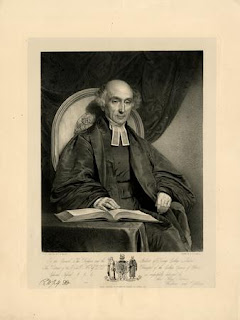"A change as to effect and power": Jelf's Bampton lectures echoing Calvin and Jewel on the Eucharist
In the sixth of his 1844 Bampton Lectures, An inquiry into the means of grace, their mutual connection, and combined use, with especial reference to the Church of England, Jelf - one of those whom Nockles lists as the 'Zs', the post-1833 continuation of the Old High tradition - addresses Eucharistic doctrine.
Having, as seen last week, rejected Transubstantiation on high Reformed grounds, Jelf takes care to note that this does not at all equate to a denial that any change takes places in the bread and wine. This, of course, reflects the Reformed understanding, expressed by Calvin:
if it be asked whether the bread is the body of Christ and the wine his blood, we answer, that the bread and the wine are visible signs, which represent to us the body and blood, but that this name and title of body and blood is given to them because they are as it were instruments by which the Lord distributes them to us.
This is the sacramental change which occurs in the elements, the change which Jewel declares in the Apologie:
We affirm that bread and wine are holy and heavenly mysteries of the body and blood of Christ, and that by them Christ Himself, being the true bread of eternal life, is so presently given unto us as that by faith we verily receive his body and his blood
Jelf reaffirms this understanding of sacramental change:
And yet, while our Church thus denies the doctrine of Transubstantiation, she does not seem to maintain that the consecrated elements are in all respects the same as they were before consecration. There are few persons who would not acknowledge that here is a change as to effect and power. Many of our best divines have held that a sacramental and spiritual conversion, though not a natural and bodily one, is wrought as in a mystery by God's invisible power; and our own Church has evidently determined that the elements, so consecrated, should not be treated as common bread and wine ...
Why not content ourselves with believing, that, as some of the ancient Liturgies expressed it, the bread and wine are made to us the Body and Blood of Christ; that there is that in them, which is, by Divine appointment, capable of working, and, received with faith, does work within us the true Presence of the Lord's Body and Blood.
The emphasis by Jelf on "for us" is almost certainly taken from Cranmer's refutation of Gardiner, regarding the invocation in the 1549 rite that the bread and wine "maie be unto us the bodye and bloude of thy moste derely beloved sonne Jesus Christe":
And therefore in the Book of the holy communion, we do not pray absolutely that the bread and wine may be made the body and blood of Christ, but that unto us in that holy mystery they may be so; that is to say, that we may so worthily receive the same, that we may be partakers of Christ's body and blood, and that therewith in spirit and in truth we may be spiritually nourished.
(We might note, by the way, that this was also Laud's defence of the same invocation in the 1637 Scottish rite.)
The Hookerian-sounding phrase "work within us the true Presence of the Lord's Body and Blood" is further emphasised by a footnote: "That this operation does not take place irrespectively of the spiritual state of the receiver, is expressly maintained by our Church. Art. xxix".
The contrast with the Eucharistic theology that was emerging from Tractarianism is stark. Jelf is reaffirming, not rejecting, the high Reformed sacramental teaching of the Formularies, Jewel, and Hooker. In doing so, he was providing a sacramental theology which had the potential of both renewing Anglican sacramental piety and practice, and providing a unifying, coherent centre for an Anglicanism increasingly divided in the 19th century. Mindful of the incoherence of contemporary Anglican eucharistic theology, Jelf's approach has much to teach us in the 21st century. No less significantly, it also provides an important corrective to the 'table fellowship' understandings which have followed in the wake of the Parish Communion movement.




Comments
Post a Comment